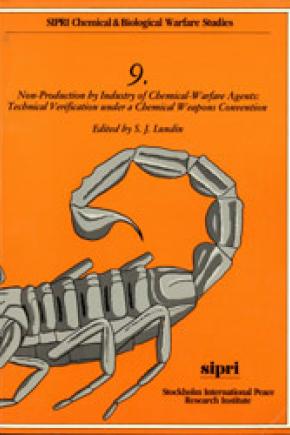Non-production by Industry of Chemical-warfare Agents: Technical Verification Under a Chemical Weapons Convention
In this monograph 25 experts describe the state of the chemical weapons negotiations, practical industrial-monitoring experiments, different monitoring techniques and schemes, national reporting systems as bases for a future international reporting system, and applicable experiences from the International Atomic Energy Association. Examined are the technical possibilities of monitoring the chemical industry under a future Chemical Weapons Convention (CWC) in order to ascertain that no prohibited chemical-warfare agents are produced by the chemical industry and that certain chemicals which can be used for production of both chemical-warfare agents and for peaceful purposes are not produced in excess of agreed amounts. Suggestions are provided for possible application in the CWC negotiations. 5 annexes contain relevant parts of the negotiated CWC text, a bibliography, relevant OECD guidelines, and a schematic overview of the verification objectives of the CWC.
Contents
Part I. Introduction
Introductory remarks (S. J. Lundin)
An overview of verification objectives under a Chemical Weapons Convention (S. J. Lundin)
Principal objectives of verification methods and results (R. Trapp and W. Rehak)
International institutions of the Chemical Weapons Convention (CWC) under negotiation: An introductory outline of the emerging organization and its principal organs
Part II. Reports of on-site experiments in chemical plants
Verification of non-production of chemical weapons and their precursors by the civilian chemical industry (S. E. Freeman and R. J. Mathews)
An experimental inspection of a multi-purpose plant (B. ter Haar)
Report on the visit to VEB Synthesewerk, Schwarzheide, GDR, during the 12th Workshop of the Pugwash Study Group on Chemical Warfare in 1987 (H.-J. Jeschke and T. Stock)
Part III. Applicability of technical methods for monitoring of chemical industry production
Monitoring methods in industrial production relevant to the projected Chemical Weapons Convention (J. Matousek)
Verification of equipment for on-site inspection teams under the proposed Chemical Weapons Convention (M. Rautio)
Verification of non-production of chemical-warfare agents in the civil chemical industry (A. Verweij and H. L. Boter)
Possibilities for automatic monitoring of chemical products (O. V. Perroni)
Some views on the control of multi-purpose plants (H. Schröder and H. Hoffmann)
Instrumented monitoring of the chemical industry under a chemical weapons ban (N. Kyriakopoulos and R. Mikulak)
Reliable identification of chemical-warfare agent micro-concentrations as the basis for a system of verifying compliance with the non-production of chemical weapons (V. A. Rylov)
Approaches to the use of instruments in monitoring the production of chemical weapons and precursor chemicals (L. Zeftel, P. Weinberg and J. Schroy)
Part IV. Collection and use of production statistics, handling of sensitive information
Considerations on the collection of production statistics and handling of sensitive information under a Chemical Weapons Convention (K. Nishikawa)
Remarks on data collection and handling of sensitive information under a future Chemical Weapons Convention (O. V. Perroni)
The data-reporting system in verification of non-production (Sun Xiangyin)
Part V. Experiences from IAEA
The Chemical Weapons Convention and some IAEA experiences (A. von Baeckmann)
Part VI. Conclusions
Concluding remarks (S. J. Lundin)
Part VII. Annexes
Annex 1. The table of contents and Article VIII from CD/831
Annex 2. Article VI and its Annexes 0 to 4 from CD/831
Annex 3. Bibliography of publications of relevance to this study
Annex 4. Excerpts from OECD Environment Monographs, no. 4
Annex 5. Tables 1 to 6, presenting the relation between verification aims, methods, requirements and resources
About the editor
Dr S. J. Lundin, who assumed responsibility for the SIPRI CBW programme in 1987, is the Series Editor. He has served as a Director of Research of the Swedish National Defence Research Institute (FOA), and was for 16 years Scientific Adviser to the Swedish Delegation to the Conference on Disarmament in Geneva. He has been a consultant to the United Nations Centre for Disarmament, and has convened SIPRI and Pugwash symposia on matters relating to chemical weapons.
SIPRI Chemical & Biological Warfare Studies is a series of studies intended primarily for specialists in the field of CBW arms control and for people engaged in other areas of international relations or security affairs whose work could benefit from a deeper understanding of particular CBW matters. The papers originate in studies commissioned by SIPRI as input for subsequent non-specialist SIPRI publications.

